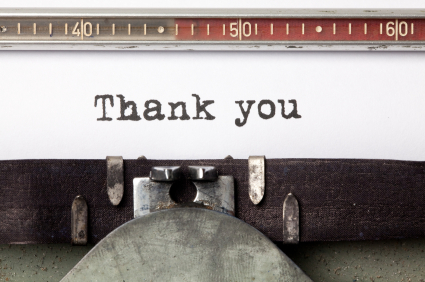

Did you have to write thank you letters at Christmas and birthdays when you were a kid? Did you groan and moan piteously while your mom stood over you, threatening dire things if Grandma didn’t get that note in the next few months? Do I do this to my own children, too? Of course! Most of us have had to write a note thanking someone for a gift or a service they appreciate, and if you have been the recipient of a thank you letter on paper, you know the feeling you have about that writer. It is impressive in today’s email world, and most people don’t do it. It’s the right thing to do.
In the hiring world, there are many faces seen and forgotten as applicants crowd into the arena vying for a job. One of the most impressive ways to do an interview follow up for maximum success is the old-fashioned thank you letter. On paper. To hold in your hand and look at again.
In one simple act, that of observing a professional courtesy, you have given the interviewer a reason to remember you positively. I am assuming the thank you letter is one that meets professional standards, is well-written, concise, and mentions specific favorable points in the interview. It will be a tangible reminder of your assets for the position if it reflects your good points and comes in the week following the interview.
There is a place for an email thank you letter, and your research on the company will help you determine its appropriateness. Most of the time, though, the “real thing” is going to be the best thing. If you do decide the email thank you letter is preferred, all the rules about professionalism apply! This is no place for typos or formatting errors, so make sure your final impression is an excellent impression when following up that job interview.
This is part of the package when writing your resume, the final piece of the cover letter-resume-thank you letter trifecta. Don’t ignore it!
Today’s Guest Post is by Medical Sales Recruiter, Peggy McKee

<>
The era of the thank you note after a job interview is over.
Well, not the actual “thank you,” just the delivery system.
It’s critically important that you thank the interviewer for the opportunity, but it’s also critically important that you get it to him within 24 hours. And a handwritten, snail-mailed note just won’t do that. Send an email.
Many people still extol the virtues of the handwritten thank you note as a way to demonstrate your good manners and set yourself apart in the interview process. But while that’s nice, it’s not necessarily effective. A well-written thank you note already demonstrates your good manners and excellent communications skills. You don’t need to put a stamp on it to do that.
But there’s something else that comes into play here: As a recruiter, I know that many hiring decisions are made quickly. You can’t wait to send your thank you just in case this window of opportunity is one that will close quickly.
What should you make sure you include in your message?
In your thank you email, you should talk about how much you appreciated the opportunity to meet with them, how much you enjoyed learning more about the organization, how you think your x, y, and z skills will really help their company with a, b, and c issues, and how you’re looking forward to talking with them further about this process.
If you meet with 4 people, you need to send 4 thank you emails.
But here’s one note of caution: While I’m all for sending your note quickly, don’t go too far and try to send it with a text from your phone. There are too many opportunities for mistakes-and they have been made. Stick with your email-and spell check it.
+++
Peggy McKee has over 15 years of experience in sales, sales management, sales recruiting, and career coaching. She has one of the best blogs I’ve ever read and it is jam-packed with information you need to get into medical sales or increase your sales. Go to https://www.phcconsulting.com and see for yourself.
